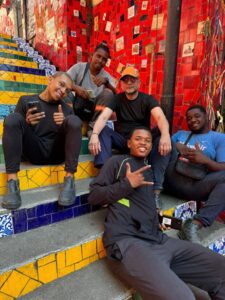(Mentors Collective, April 2025)
“Sometimes I feel like everything is broken,” a college student once told me.
Talk to young people today, and your heart may break.
They grew up with 9/11, wars in Iraq and Afghanistan, climate change, uncertain economic times, and Covid. Their world is flooded with misinformation and disinformation, racism, misogyny, and authoritarian noise. Networks of traditional institutional support, leadership, and guidance are failing. In their place, social media influencers herd communities of followers into their self-serving algorithmic bubbles, filling the void with suspicion, intolerance, and rage while they profit from every lonely click.
Amidst all this, one thing has never been more essential: mentorship.
And yet, in the face of these daunting challenges, how is mentoring supposed to happen?
I have five suggestions. But first, here are a few key perspectives that I have gained from my own journey in mentoring.
My first mentors were my parents. Their primary lesson, day in and day out, both in word and deed, was the importance of empathy. Whether it was my father’s labor organizing or my mother’s commitment to feeding the less fortunate with food, she made herself in our humble kitchen, their engagement for others inspired me even at a very young age. Before I knew it–and before I knew what the word “mentor” meant, I was one.
At age 14, I started the Calcutta Youth Club. It was a space where my friends and neighbors would come for guidance from me and anyone else who happened to be there. And it was a place where I could seek advice from others in the community.
Those were times of adversity as well. Although our community was middle class, a few blocks away were neighbors who lacked basic support services. The club and the relationships it spawned were crucial in helping people deal with the challenges of life.
None of us had degrees in mentorship. But we cared and were willing to invest in one another. Many of us are still giving and receiving counsel.
That experience shaped my view of mentorship. I learned that it doesn’t have to be formal. It isn’t a quick fix to a momentary problem but a relationship that evolves over time.
Mentoring is primarily a state of mind. It’s about being ready to open ourselves to new impulses and ideas and being responsive to the people around us. Cultivating a mentoring mindset means valuing human interactions as moments of teaching and learning, empathy and compassion, investment and solidarity.
I have also learned that mentoring is reciprocal, usually in the form of “paying it forward.”
Over 40 years since I started the Calcutta Youth Club, I’ve traveled to more than 30 countries. I’ve met farmers, heads of state, entrepreneurs, children in orphanages, community organizers, CEOs, philanthropists, movie stars and sports celebrities, spiritual leaders, and countless others. Their life stories reveal that they both benefited from mentoring and mentored others. In fact, many of the accomplishments for which they are acclaimed can be called acts of mentorship.
Once you see the world in this way, humanity is no longer a random assortment of isolated individuals but a network of mutual aid and engagement. It’s very much like a family.
At SOS Children’s Villages, I witnessed the quiet power of mentorship. One of the core principles of SOS is to keep siblings together. When this is not possible, older children, some of whom were orphans and others placed there due to difficult family circumstances, often step into the role of protector, teacher, and friend to younger ones. These weren’t formal mentorship programs–they were raw, human connections formed out of empathy and shared experience. These raw human connections, born from empathy and shared struggle, embodied mentorship at its finest.
So, how can you get involved?
Here are five simple ways you can mentor others, starting today:
–Offer career advice—Review resumes and cover letters, share the lessons you have learned, and explore the potential of local job centers or platforms like LinkedIn to engage those in need. This will give young people tools and agency.
–Speak at school career days or youth groups to inspire the next generation—and to learn from them. Just listening can help them feel more relevant and empowered.
–Create or join a peer mentoring group at your workplace, job center, church, or other gathering spot. Adults often lack opportunities to form these productive relationships, and that makes it easier to feel overwhelmed with life’s demands, some of which involve parenting. Lending a sympathetic ear eases the burden on both parties.
–Leverage your network—Blogs and social media posts, LinkedIn articles, or even short videos about your mentoring journey can offer wisdom to those seeking guidance and inspire others to connect.
–Stay consistent—If you already participate in a mentoring relationship, remember that regular check-ins with mentees build trust, accountability, and momentum.
To mentor someone is to give a gift that multiplies every time it’s given. Whether you’re guiding one person or many, your impact will ripple far beyond what you can see. And especially in times of adversity, mentorship reminds us that we only really rise by lifting others.
Neil Ghosh is a seasoned executive whose expertise spans the nonprofit, government, philanthropic, and private sectors. His book, Do More Good: Inspiring Lessons from Extraordinary People, showcases some of the most captivating individuals in modern history—people he has met and interacted with on his mission to inspire meaningful change.





